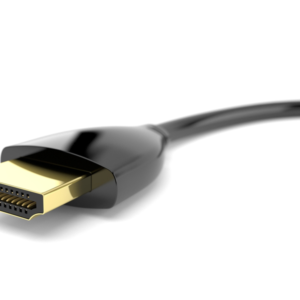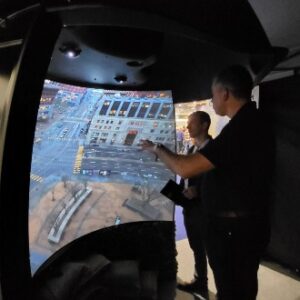Mark DelGuidice and George Fournier Jr. explain why on-the-job safety for AV integrators is more important than ever during the COVID-19 pandemic
As many AV integration firms across the country continue to work in some capacity as essential-service businesses during the COVID-19 pandemic, it has become critical to address the serious health and safety concerns raised while working in the field. Mark DelGuidice and George Fournier, Chair of AVIXA’s Systems Integrators Council, address how the Center for Disease Control’s safety rules can go further to protect integrators that are still on the job and provides guidance on measures they can take now to stay safe.
AVNation: AV job safety has always been a consideration in the AV industry. Are the current measures recommended by the CDC during the pandemic enough?
George Fournier: The industry really hasn’t had to deal with a public health issue like this before so I guess they are holding back on providing direction to err on the side of caution but that doesn’t really help the techs in the field very well.
The information available on the virus SARS-CoV-2, which causes the COVID-19 coronavirus disease, is constantly changing thanks to all of the ongoing research. But as an industry we are operating in a “catch-up” phase because of the lack of real actionable information from the CDC and media. So, contractors are stuck in a place where we all have to weigh regulations from the Federal, State, and Local Authorities on when and how we can work. This is where we would hope someone in one of our industry associations would step into the fray and share the CDC Safety recommendations in plain English in a way that we could all use as a reference to determine our own operation and safety plans going forward. And if they could help with clearing the fog of the myths flying around on transmission and prevention it would be a huge help as well. AVIXA for one, is doing a good job sharing news and information on small business guidance, but very light on safety concerns for our industry.
Mark DelGuidice: From my perspective, their guidance has been late in coming, and no clear info on industries and job sites like ours. Here in San Diego, there were no job site regulation or requirements until just very recently, where masks are now required of some sort. Many sites a few weeks back had no real guidance, and no or little accommodations [on construction type locations] such as washing stations, or limits on how many can be in an elevator, and no mask requirements. Many like our company just tried to interpret as best we could, and we got masks on the techs a few weeks ago, to be as careful as we could.
AVNation: What further or special measures should AV pros be taking during the COVID-19 pandemic, especially those working as essential service workers?
DelGuidice: In my opinion, and, after speaking with public servants and medical staff I know:
- medical grade masks, [N95 preferably, or, at least “clean room” masks ] at all times, to ensure no one can infect other coworkers onsite
- washing facilities, with hot water or at a minimum plenty of hand sanitizer with the proper alcohol levels
- disposable latex gloves
- requirement to limit close contact as much as possible, four or less on an elevator, etc.
Fournier: I’ve been a firefighter and Hazardous Materials (HAZ-MAT) emergency response technician since the late 1980s and we’ve been trained in responding to chemical, radiological, and biological events. Over the years I’ve responded to Anthrax scares, SARS, and H1N1 situations. In my opinion, the opportunity for clarification of the levels personal protection equipment (PPE) required for emergency/medical personnel versus field technicians, project managers, and site workers is sorely lacking right now.
Here I will be talking about employees that are not working in hospitals or medical areas where patients and medical people are present. N95 respirators (masks) are a particulate-filtering face-piece respirator that meets the N95 standard of the U.S. National Institute for Occupational Safety and Health (NIOSH) air filtration rating, meaning that it filters at least 95 percent of airborne particles. These are not 100-percent effective but are very, very good in protecting against exposure to the SARS-CoV-2 virus — but then again nothing is 100 percent. N95 grade masks are only needed for EMTs, firefighters, police, nurses, doctors, and other medical personnel since they constantly get coughed and sneezed on by patients who are COVID-19 positive. They are in high demand right now for medical and emergency services, so we as an industry should not look at using them when a surgical or cloth mask will work. But masks only work when worn correctly, they must cover your mouth and nose at all times. Masks usually have a metal/aluminum strip in the top to help push the mask flush against your face and nose to keep the mask tight and keep your glasses from fogging up if you’re wearing any. Here’s a hint: if your glasses are fogging up your mask is on wrong.
The CDC recommendations on using cloth or surgical masks are not to protect you from getting exposed to the SARS-CoV-2 Virus, they are to keep you from spreading the virus. Especially if you have not been recently tested, you can carry and spread the virus for up to two weeks before showing symptoms or getting sick.
The Surgeon General made a video on making a quick mask if you need one.
PS: Don’t reuse disposable masks, they typically cannot be decontaminated. Cloth masks should be washed with soap and warm water daily. Always dispose of your used masks in the garbage, not an empty display box, toolbox, or on the floor or street.
Workers definitely need full time access to washing facilities, with hot water and soap or at a minimum plenty of hand sanitizer with the proper alcohol levels. Latex, Nitrile and Vinyl gloves do not provide any protection against the transmission of the SARS-CoV-2 virus. There is no evidence that the virus can be absorbed through the skin. You should not be touching your mouth, nose, or eyes, which are the only routes the virus can take to your lungs. Remember this is a respiratory virus. Additional, due to allergy concerns, Latex and Vinyl should be avoided as well. We should only use “nitrile hypoallergenic gloves” as latex can cause severe allergic reactions in the person wearing them or even people in the immediate area, very similar to peanut allergies. Latex allergy may cause itchy skin and hives or even anaphylaxis, a potentially life-threatening condition that can cause throat swelling and severe difficulty breathing.
This is a very informative video on gloves and contamination.
Social distancing guidelines should always be followed when possible. Obviously, carrying a display takes at least two people and you can’t be six feet apart while doing so but use your best judgement. If techs are traveling to a job site using separate vehicles would be best as being in a closed vehicle seated next to each other is not good social distancing. My personal opinion is that public transportation should be avoided due to sanitary and social distancing limitations.
AVNation: What will job safety look like for the AV industry as a whole, post-pandemic?
DelGuidice: I think we may see the above safety procedures required for some time as we ease back to any type of normal jobsite activity. I don’t know if that will be necessary once this is been truly resolved and we have no cases occurring of infection.
Fournier: These safety measures technically already existed in OSHA and NIOSH requirements for construction sites. Eye protection and masks for cabling, construction, painting, and sanding were always required but usually skipped due to costs and convenience. I really wouldn’t be surprised to see field personnel in coveralls or uniforms again that are cleaned weekly by a third-party service. We may need to roll out a pathogen safety class in our companies like they do in the fire and EMS departments. It’s a yearly class, usually only one to two hours on personal safety and protection procedures. For some background information, here is an example I’ve used.
The SARS-CoV-2 virus, or coronaviruses in general, aren’t going away, they’ve been around for centuries in one form or another, so there could be another pandemic around the corner. I think we are learning from the COVID-19 pandemic that we really may not need to close every single thing down but may need to go to a “DEFCON-1” response in the field till the virus/disease passes. There has to be a happy medium between total shutdown and no response. That will take time to figure out without politicizing it but clearly looking at different ways we can all safely operate and live in a world where these events will happen again.
AVNation: Are there any safety rules that we have taken for granted or ignored that will be more strictly enforced now?
DelGuidice: It’s obvious that there was confusion for worker safety, and the public’s behavior initially across the country. Look how many medical workers have now been infected, for example.
The issue of masks and sanitary measures should have been implemented much earlier. It’s fairly clear how quickly enforcement happened in Asia, I don’t see why we couldn’t have had better information a lot sooner. I am not being political here, just from an industry point of view.
Fournier: Agreed. Countries hiding or not sharing accurate information has hurt us all and removed the chance we had at coming up with preventative solutions before it got here. My major concern (excuse my soapbox) is that the media in general had an agenda leaning to one side or the other and were not a help. They should have put all that aside and used their pulpits to share as much clear and concise information as possible. In times like this the day of the sound bite or gotcha headline is hurting or actually contributing to damaging our public health. Our poor medical and emergency personnel are always caught in the budget battles. PPE is only at shortage levels because after H1N1 corporations that run the hospitals didn’t want to pay to replenish their stock and now they don’t want to allow their people to use the PPE they have safely. Cities, States, and the Federal Government are the same way, they never refilled the shelves with PPE, they just spent the monies on other pet projects.
As I step off my soapbox, I feel our industry associations have left their members swinging in the breeze when it comes to worker safety. Our workers, field people, managers, etc., need to know they can rely on our associations to provide information to keep them safe. Companies would be smart to start internal safety teams to review and/or enact programs internally to protect their employees. OSHA training shouldn’t only happen because your client requests it to work on their site. We should teach our people to be safe. Our associations should get ahead of this now.
AVNation: Will industry standards be changed/legislated in the coming years to put in place new or augmented measures?
DelGuidice: Hopefully, we as a country and an industry will learn a lot from this and be able to enact the best measures if and when anything like this were to happen again. I don’t see these more drastic measures being needed as much long term; at least I hope not. We do a great job as an industry in normal conditions, yet, this has, of course, been a crazy learning curve for everyone — heck, for the whole world.
Fournier: Agreed. I think our industry doesn’t need to reinvent the wheel. They should go out and learn OSHA safety and possibly publish white papers on how to fold this into our existing operations. The Associations have to be the watchdogs to make sure the government doesn’t over-regulate our industry out of existence.
AVNation: What are the three most important things that AV pros currently working as essential workers or thinking about signing on as an essential service can do to stay healthy, lawful and safe as we go through this crisis?
DelGuidice: I think we are approaching a much safer level, albeit I haven’t seen any specific guidance from the Construction Industry, per se, yet, or our professional organizations. There is now an edict in New York requiring even the public to wear masks. Here in San Diego it’s a “strong recommendation,” and required now for “workers dealing with the public.” I would look forward to some specific guidance and information form AVIXA and the NSCA moving forward. No doubt they are looking at that.
I think everyone in our industry and others should try to stay informed and do as much as they can to stay safe. In that regard, it’s no different than wearing a hard hat or safety gloves in any situation if you think they may help one stay safe. with that said, as I mentioned above. Yet, questions do remain:
- Will an N95 provide the best possible protection [of all from each other]?
- Since they are a bit costly, who would shoulder the extra costs?
- How long can one reuse such a mask practically?
- What’s the best way/is it possible to clean such a mask to re-use for an extended period?
Fournier: The three most important things I think everyone needs to do or be aware of to stay safe in this crisis and in the future are knowledge, knowledge, knowledge. Don’t rely on your associations, your employer, the media, Facebook, or the government to give you all of the information you need to stay safe. I’d refer to what I said above about special measures for the most part. I do think surgical or cloth masks, safety goggles, and maybe coveralls should be provided to all essential employees that are working in the field.
Get familiar with all of the guidelines offered by the CDC. Get familiar with your company’s safety and hygiene rules and regulations. Also, get familiar with all of the OSHA requirements for constructions sites. Remember, if you don’t feel safe ask management. Your health and your family’s health should be your number one priority and if your employer isn’t supporting that you will need to address that with them.









